The AMD Ryzen Threadripper 3960X and 3970X Review: 24 and 32 Cores on 7nm
by Dr. Ian Cutress, Andrei Frumusanu & Gavin Bonshor on November 25, 2019 9:05 AM ESTCPU Performance: Web and Legacy Tests
While more the focus of low-end and small form factor systems, web-based benchmarks are notoriously difficult to standardize. Modern web browsers are frequently updated, with no recourse to disable those updates, and as such there is difficulty in keeping a common platform. The fast paced nature of browser development means that version numbers (and performance) can change from week to week. Despite this, web tests are often a good measure of user experience: a lot of what most office work is today revolves around web applications, particularly email and office apps, but also interfaces and development environments. Our web tests include some of the industry standard tests, as well as a few popular but older tests.
We have also included our legacy benchmarks in this section, representing a stack of older code for popular benchmarks.
All of our benchmark results can also be found in our benchmark engine, Bench.
Speedometer 2: JavaScript Frameworks
Our newest web test is Speedometer 2, which is a accrued test over a series of javascript frameworks to do three simple things: built a list, enable each item in the list, and remove the list. All the frameworks implement the same visual cues, but obviously apply them from different coding angles.
Our test goes through the list of frameworks, and produces a final score indicative of ‘rpm’, one of the benchmarks internal metrics. We report this final score.
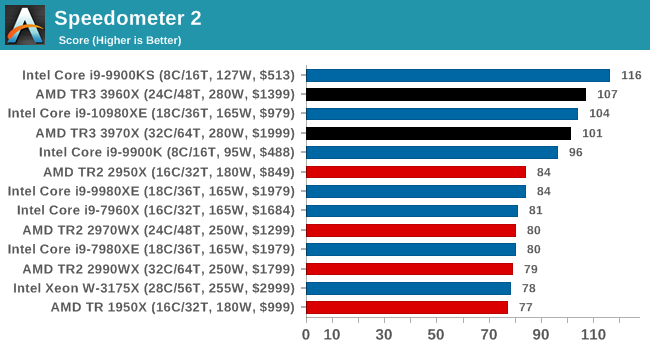
Google Octane 2.0: Core Web Compute
A popular web test for several years, but now no longer being updated, is Octane, developed by Google. Version 2.0 of the test performs the best part of two-dozen compute related tasks, such as regular expressions, cryptography, ray tracing, emulation, and Navier-Stokes physics calculations.
The test gives each sub-test a score and produces a geometric mean of the set as a final result. We run the full benchmark four times, and average the final results.
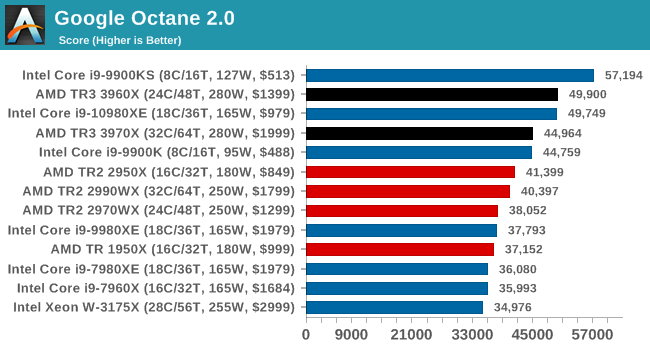
Mozilla Kraken 1.1: Core Web Compute
Even older than Octane is Kraken, this time developed by Mozilla. This is an older test that does similar computational mechanics, such as audio processing or image filtering. Kraken seems to produce a highly variable result depending on the browser version, as it is a test that is keenly optimized for.
The main benchmark runs through each of the sub-tests ten times and produces an average time to completion for each loop, given in milliseconds. We run the full benchmark four times and take an average of the time taken.
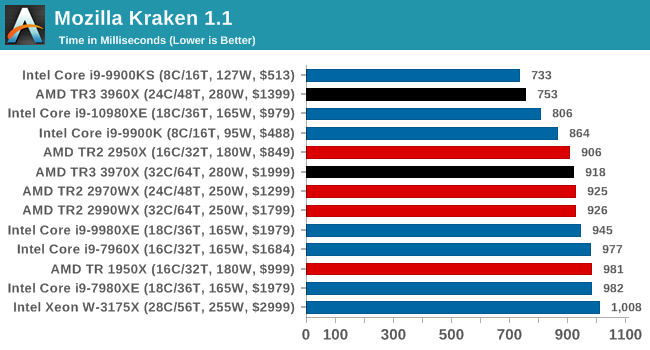
3DPM v1: Naïve Code Variant of 3DPM v2.1
The first legacy test in the suite is the first version of our 3DPM benchmark. This is the ultimate naïve version of the code, as if it was written by scientist with no knowledge of how computer hardware, compilers, or optimization works (which in fact, it was at the start). This represents a large body of scientific simulation out in the wild, where getting the answer is more important than it being fast (getting a result in 4 days is acceptable if it’s correct, rather than sending someone away for a year to learn to code and getting the result in 5 minutes).
In this version, the only real optimization was in the compiler flags (-O2, -fp:fast), compiling it in release mode, and enabling OpenMP in the main compute loops. The loops were not configured for function size, and one of the key slowdowns is false sharing in the cache. It also has long dependency chains based on the random number generation, which leads to relatively poor performance on specific compute microarchitectures.
3DPM v1 can be downloaded with our 3DPM v2 code here: 3DPMv2.1.rar (13.0 MB)
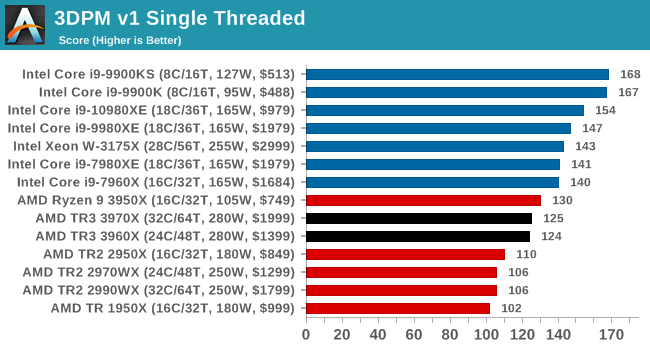
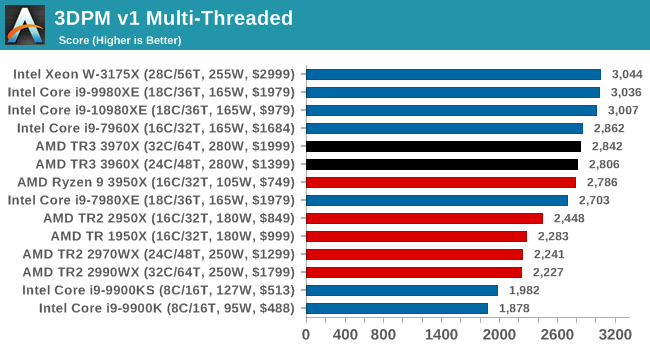
x264 HD 3.0: Older Transcode Test
This transcoding test is super old, and was used by Anand back in the day of Pentium 4 and Athlon II processors. Here a standardized 720p video is transcoded with a two-pass conversion, with the benchmark showing the frames-per-second of each pass. This benchmark is single-threaded, and between some micro-architectures we seem to actually hit an instructions-per-clock wall.
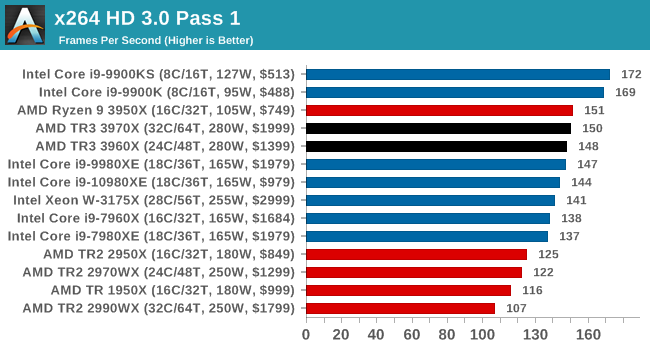
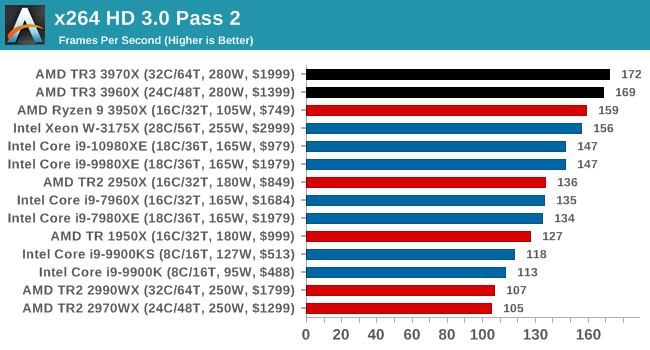
GeekBench4: Synthetics
A common tool for cross-platform testing between mobile, PC, and Mac, GeekBench 4 is an ultimate exercise in synthetic testing across a range of algorithms looking for peak throughput. Tests include encryption, compression, fast Fourier transform, memory operations, n-body physics, matrix operations, histogram manipulation, and HTML parsing.
I’m including this test due to popular demand, although the results do come across as overly synthetic, and a lot of users often put a lot of weight behind the test due to the fact that it is compiled across different platforms (although with different compilers).
We record the main subtest scores (Crypto, Integer, Floating Point, Memory) in our benchmark database, but for the review we post the overall single and multi-threaded results.
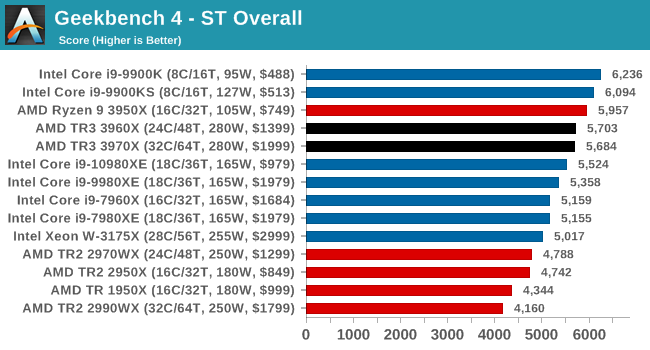
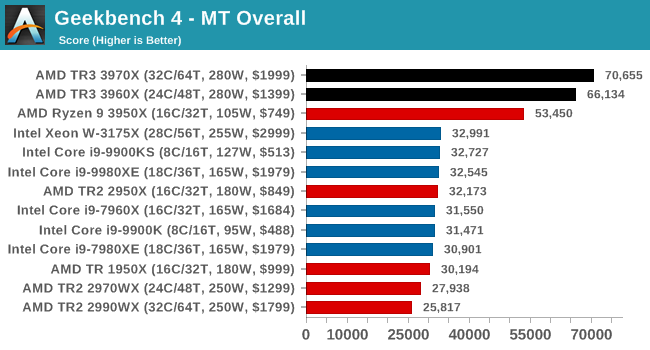










245 Comments
View All Comments
jmelgaard - Monday, November 25, 2019 - link
They also somehow forgot that AMD has been virtually invisible in the desktop CPU market for the last ~10 years, yet they managed to survive and pull this incredible victory.But for some reason, that would be unthinkable that Intel could turn things around... o.O... Pure idiocracy...
Besides, it doesn't matter if your an AMD or Intel fan, if you don't wan't both to be in the game your a pure moron, the status quo we have seen from Intel the past 10 years is exactly what we will see if they aren't both in the game. They are there to push each other, to the overall benefit for us, the consumers. If Intel really where to go out of business, then AMD would just begin to milk...
It's f****** amazing how dumb some people are...
AMD has the absolute and clear victory this time, if Intel has anything meaningful to respond with in the near future, well only time can tell...
But for now... Lets just praise what AMD has done, cheer for the amazing launch and well earned victory after what can only have been 10 long years of hard work, and hope that Intel returns... Hopefully sooner than AMD did... Or... On the other hand it's been 10 rather cheap years computer wise for me, so... perhaps I should cheer for Intel to take 10 years for a decent knockout punch in the other direction...
DannyH246 - Monday, November 25, 2019 - link
Intel will DEFINITELY return and with Jim Keller on board i'm sure in 2-3 years they will return with a vengeance. I do hope however that everyone remembers what we have been saddled with from Intel for the last 10 years...No innovation, crazy pricing, artificial market segmentation, forced new motherboard purchases every year etc etc. In short - Intel have shafted us for years and are only working like crazy now because AMD launched a rocket up their back sides. Lets hope AMD continues innovating & executing as they have been. That's not Fanboyism, its just common sense.lobz - Tuesday, November 26, 2019 - link
What gap in IPC? You think intel's Coffee Lake has a higher IPC than Zen 2? Please get your facts straight before you try to criticize other people's comments.Der Keyser - Monday, November 25, 2019 - link
AMD are really doing wonders with their ZEN2 architecture :-)But with the latest pricing of the higher end R7 and R9 and now TR I think they are making a GREAT mistake. They have decided to capitalize on having reached their target of beating Intel on performance. So prices are no longer vastly better than Intel, and we are moving into having AMD/INTEL pricing close enough not to matter to the average consumer.
This is a very short sighted decision as AMD right now has a once in a lifetime opportunity to really kick Intel in the n***. Intel’s production capability and proces node is lagging - as is their architecture. This is the time to set pricing and performance at a level were DELL, HP, LENOVO and so on are unable to ignore or downplay the AMD option because of intel funding - because that is happening now, and will continue when AMD is getting similarly expensive.
Ditch the lower end SKU’s and drop the prices on mid and high-end SKUs with 20 - 30% now and gain what AMD never had before: Market superiority to really establish their name as a household processor brand. Will all know Intel will retaliate within the next two years once their 10 and 7nm comes full online, and once that happens, AMD will once again battle with the “unproven and small player” moniker because they never got REALLY big - Getting rid of that moniker should be their second and REAL goal of this ZEN2 era. This short term money grab with the new pricing is what will keep AMD in the shadows of Intel going forward.
liquid_c - Tuesday, November 26, 2019 - link
This! So much this! I have no brand loyalty but somehow, people either chose to forget all of AMD’s mishaps (fake turbo boosts, pricing during their Athlon days, declaration of MB compatibility with future CPU gens but when time comes, they point fingers at MB vendors, etc.)liquid_c - Tuesday, November 26, 2019 - link
...or they hate Intel that much (no edit button..)Korguz - Tuesday, November 26, 2019 - link
liquid_c looks like you may be used to the way intel does things, have you seen this article :https://www.anandtech.com/show/15137/amd-clarifies...
or this one :
https://www.anandtech.com/show/14873/reaching-for-...
and what about intels TDP ratings on their cpus ?? people harped and criticized amd for the power their cpus used before zen, but, yet, when intel does the same... it seems to be ok ??
or, that just hate amd that much ....
peevee - Monday, November 25, 2019 - link
Too bad the test actually relevant to the class of CPUs, namely compilation, is gone.Also looks like some results are old, before OS and BIOS patches for security (Intel) and performance (AMD).
tony p - Monday, November 25, 2019 - link
does anyone know can I swap CPU heatsink between Socket TR4 and TR3Slash3 - Tuesday, November 26, 2019 - link
X399 and TRX40 boards use the same physical socket - heatsinks are compatible with all three generations of Threadripper.